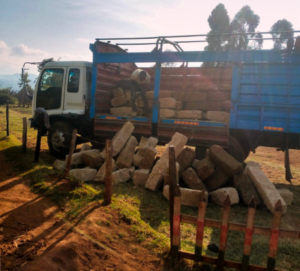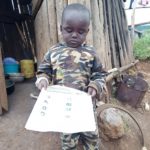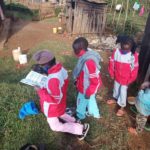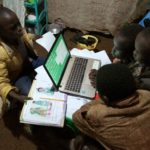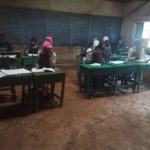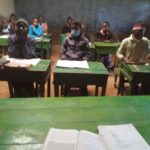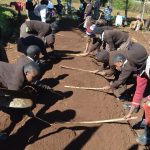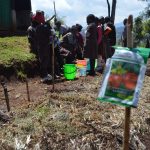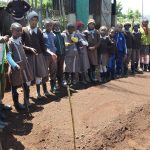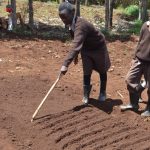Dialogue as stylistic device refers to spoken lines by characters in a story that serve many functions such as adding context to narrative, establishing voice and tone. Writers utilize dialogue as a means to demonstrate communication between two characters. Most dialogue is spoken aloud in a narrative, though there are exceptions in terms of inner dialogue. Writers denote dialogue by the use of quotation marks (Indicating spoken words) and dialogue tags (words such as “said” or “asked” indicating which character in the narrative speaking). Dialogue allows writers to pause in their third person description of story’s action, characters, setting, etc., which can often feel detached to the reader if prolonged. Instead, when characters are speaking in first person in a narrative, the story can become more dynamic. When Akoko’s potential suitor from Sakwa came to the great Chief Odero’s compound, Odero’s eldest son was sent to inquire more from the visitors through dialogue, the conversation started where the wizened old man (Owuor Kembo’s uncle) started the conversation and said to Okumu, “ We have come to see Odero the son of the great Chief Gogni Adinda for the purpose of betrothing our family to his for even as far away as Sakwa we have heard of the beauty and the spirit of his eldest daughter…..” the dialogue continue to show the reader about the importance marriage to the chief where he continues to say “………It is unthinkable that chief should be unmarried, a situation which has arisen only because of the sudden death of his father, the young chief himself being very young………..” In order to set standards for his daughter and to get an assurance of his daughter welfare, Chief Odero asked these to question to the visitors “And how, may I ask is the savanna country of Sakwa? Were the rains adequate and the harvest plentiful? I have heard that a strange malady has killed many cattle in that place.” And because Owuor Kembo’s wanted his nephew to mmarry the daughter of the great chief Odero, he responded to the Chief by assuring him the safety of his daughter and she will not starve by responding and said “The rains were adequate and the food in the granary will feed us well after the next harvest.
The rumours you heard was true but Were , praise be his name, protected most of our cattle, and besides the dead chief had only two sons and many daughters who will continue to bring in more wealth.” As both parties continued to negotiate the dowry price, Chief Odero called on Aloo K’ Olima, his spokesman, and they had a sidelined dialogue where he set the conditions to his daughter’s suitor Owuor Kembo and said to him, “………Set the bride price at thirty head.” Then Olima replied in disbelief to show how the expensive the bride price is ”Third head!” and to farther for Chief Odero to get the assurance that his daughter will not starve in Sakwa and to piss them off he said to Olima, “Let them show us that my daughter is not going to starve in that wasteland they call home.” In a show of dissatisfaction of the bride price which was very expensive, Owuor’s younger brother, Otieno exclaimed “Thirty heads!”………….”That is enough to marry three wives. Women are all the same Owour, lets get out of here.” The young chief Owuor Kembo insisted that he the chief’s daughter through dialogue when he responded to his younger brother, “My father, my mother, my brothers, I think you are mistaken. Not all women are the same. This woman is going to be my mikai not just my wife. Besides I have set my heart on marrying her. we shall do as they say.” On this Owuor Kembo dislays his affection to chief’s daughter through dialogue. When Kembo’s wife, Akoko called meeting through wailing to attract the attention of the villagers, she proclaimed her importance to the people of Yimbo even without having so many children as the norms among the African rulers, she convince people the other importance making wealth apart from giving birth to a mostly male dominated society, it is that the position of women are revealed through the dialogue by one of the villager, ‘And where might he be?” asked one of the villager who couldn’t believe the woman can make talk such without the permission from her husband. In response her brother in law, Otieno responded in a show of contempt and threats to Akoko that “He (Kembo) went to a friend’s funeral the day before yesterday and is due back today. Meanwhile I will this sh-wolf a lesson……” In a show of his wife’s actions, Chief Owuor Kembo defended his wife in the council of Jodong and said “………It is shameful thing for my wife to leave her husband’s house and return to her father’s house. This is outrageous thing has occurred only because I was not here to prevent it.” While the elders were supporting chief’s mother to have other wives, one Oyier replied to him”…………Long have we pleaded with you to take another wife for yourself and you have adamantly refused…..” Through dialogue Akoko revealed the reason why she left her home when a group of seven Jodong and the chief arrived in Yimbo to negotiate the return of their wife, she said “……….may I state from the outset that leaving my house was a great wound in my heart and that I had never even thought about it until the night before it happened, and this inspite of abuse and insults heaped upon me by my mother and brother in law……….i therefore felt it was a great insult to my honour and pride to be accused of witchcraft against my own husband who has been good to all of us and has conducted himself most honorably as a good……”through dialogue the character of Akoko is revealed as being open minded and flexible to changes and uncompromising “………it is not my place to order the chief to marry or not to marry. I m pleased, of course, that,……..” the character of her husband chief Kembo is also revealed as caring husband and a father as he says “………I have always treated her well and we have lived in peace and friendship. For this reason I find it difficult to beleve she could leave her home without at least waiting for my return……….since she knows I have always stood by her over the last ten season………”In his advise toward Akoko Oloo son of Olima, is portrayed as an old man with full of wisdom that he advices to Akoko that she should not rush to make decision out of emotions, he says “………the fair thing to have done here would have been to wait for your husband to see his stand before making a decision, in future please think before you act.” When the white men came they were very arrogant, avid and killers according to the novel River and the source by Margaret Ogola and this shows Africans were had no currency as a medium of exchange in pre-colonial period, we know this during a dialogue between Obura and her mother Akoko when he asked, “and where does one get this pesa from?” during this conversation it was revealed through dialogue that Africans had no other means of transport and were not constant tourist outside their home area, as revealed by Ambere and Nyaroche, Obura to his mother Akoko “Mother, do you know that I’m almost seventeen seasons and I have never been anywhere except Yimbo……….”Obura shows his admiration to his mother, Akoko through dialogue as a wife material who is different from many women, “……………….I won’t marry until I meet a girl exactly like you. Girls can be so empty ended.” Through dialogue we see how Akoko wanted grandchildren from her son Obura, “…….it is your duty to marry as soon as you can and provide grandchildren for me…….” Obura wished to adventure outside Sakwa and explore the world of white man’s magic, he is also not ready to marry in hurry, through dialogue we know that Obura wanted to explore world before settling on marriage. Kembo to Obura:
“ My son,”
“yes father?”
“How old are you now?”
“Almost seventeen, father.”
“Really! And look at you-youre a man already. You have grown very fast my son.” “……………………I think you should start looking for a girl, my son. “………………. Oh no father!” “……………I’m so young. I don’t know anything. I feel it would better for me to go out and see the world before I settle down.” We have been introduced to a new religion which came with colonialists through dialogue where someone asked, “…….since their god had a son……….”……. “……this son of their god died to save them.” Colonial administration in Kenya and World War I were revealed through dialogue as the strangers brought news of sirikal to the chief, “you may have heard that the country is being ruled by white people now. They with some black people have formed something like the council of Jodong, only much bigger, to make sure that everyone lives in peace according to the new law. This is sirikal.” The world War I was revealed the messengers said to the chief, “……a clan of white people called jo-jerman, started a war with everybody in the world joining in and taking their side or the side of our white people the jo-ingereza who have eventually won this war.” The world war II which was fought by British and allies against German and her allies took many casualties and deaths among them Africans who were used as frontline fighters and connon fodder, this is revealed when Obura was killed fighting in Tanganyika on the side of the British against Germans. “……the names of the three are Obura Kembo, Ambere K’ongoso and Nyaroche Silwal. They went to fight jo-jerman in a place called Tanganyika, a country of black people ruled by jo-jerman. Nyabera’s love for her late brother Obura, who comes in her dream, through dialogue with her mother Akoko “its about Obura, we are both children and he comes with that funny beetle on a string and I start laughing the beetle and lands on my shoulder. The struggles of both Akoko and her daughter Nyabera are revealed dialogue as they discussed the late Obura and her father Owuor “…….May Were find it in his heart to fill our hearts with laughter again.”
Margarete Ogolla employs this linguistic aspect to communicate directly to the contemporary society about issues that affect the human person. She focuses on the theme of love and courtship, respect, family responsibility, role of women in a society, women empowerment, feminism, theme of tradition, education, death, the theme of transformation and change and colonialism in the text.

